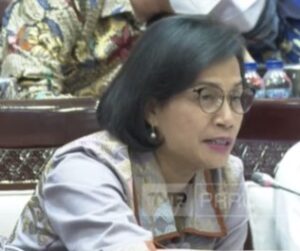
STRATEGIC ASSESSMENT. Indonesia’s fiscal deficit as of Dec. 14 was equal to 1.22per cent of gross domestic product, much smaller than the latest government outlook, the finance minister said amid strong revenue collection and good budget discipline.
The data was hailed by some analysts as good fiscal management, after the government recorded large deficits in 2021 and 2020 to help Southeast Asia’s largest economy navigate the impact of the COVID-19 pandemic.
Indonesia booked a fiscal deficit of 237.7 trillion rupiah (US$15.24 billion) or 1.22per cent of GDP as of mid-December, Sri Mulyani Indrawati told an online news conference. That was much narrower than the revised budget deficit for full-year 2022 of 4.5per cent of GDP and officials’ latest guidance of a deficit of around 3per cent this year.
There is not expected to be an Indonesia recession in 2023 – even as the global economy looks to be heading for a period of sluggishness that threatens to weigh on growth in southeast Asia. The country’s central bank, Bank Indonesia (BI), estimates that Indonesia’s gross domestic product (GDP) could grow by 4.37% in 2023, down from 5.2% in 2022.
Following the success of the burden-sharing agreement between Bank Indonesia (BI) and the Finance Ministry in financing the fiscal deficit over the past three years to prevent a deeper economic crisis during the COVID-19 pandemic, the government and the House of Representatives have agreed to maintain that cooperation under the newly enacted omnibus Financial Sector Law. But many analysts in the private sector have criticized the BI monetary financing obligation as a moral hazard, warning that the burden sharing could compromise BI’s political independence. They argue that such burden sharing is supposed to be a temporary measure only, an emergency measure to cope with an economic crisis like the one experienced in early 2020 when the economy contracted by 2.1 percent.

Meanwhile, The Coordinating Minister for the Economy, Airlangga Hartarto, said that the investment commitment that Indonesia received during the Bali G20 Summit reached US$700 billion. The investment commitment, he continued, consisted of several types of programs, including bilateral and multilateral projects, as well as special projects from one country. “In the G20 we managed to compile 226 programs that are multilateral in nature and 140 projects that are bilateral in nature with a value of US$71.5 billion,” he said at the G20 appreciation night event which was held at the Fairmont Hotel, Tuesday (20/12/2022). Airlangga said that with these various projects, Indonesia took advantage of the G20 agreement to increase the trust and confidence of other countries to partner with Indonesia. According to him, the government hopes that the investment commitment during the G20 event will boost domestic economic performance. One of the investment commitments with an astounding value recorded during the Bali G20 Summit, includes the mobilization of up to US$ 600 billion of funding from the United States and the G7 countries over the next 5 years through the Partnership for Global Infrastructure and Investment (PGII) scheme.

Finance Minister Sri Mulyani said she would monitor the fulfillment of promises from the United States, Japan, and other international partners regarding energy transition investments worth $20 billion (IDR310 trillion), which are planned over the next three to five years.
She also promised to collect other commitments related to energy transition investments made outside of the Just Energy Transition Partnership (JETP), including $500 million (IDR7.8 trillion) from the Climate Investment Fund (CIF).
Meanwhile, many of Indonesia’s NGO activist and other activist have appreciated that G-20 summit had brought benefit for Indonesia’s national economic, even though they want both of Airlangga Hartarto and Sri Mulyani Indrawati can make sure that all of G-20 summit results can be realized and it does not global promises due to the only on “portofolio papers”.
Indonesia’s economic trajectory in 2023
Head of the Trade Policy Agency of the Indonesian Ministry of Trade Kasan has projected a trade surplus of US$38.3 billion to US$38.5 billion in 2023. “Next year, we try to predict that there is still a possibility that we will still have a trade balance surplus. This growth figure will depend on the situation to be faced, including in export destination countries,” Kasan stated.
Trade Ministry official Kasan said he projected a trade surplus of $38.3 billion to $38.5 billion in 2023. The Trade Ministry is targeting non-oil and gas export growth to lie in the range of 3.9 to 4.7 percent next year. Meanwhile, oil and gas exports are projected to grow 6.8 to 8.0 percent.
The Ministry of Trade is targeting non-oil and gas export growth to lie in the range of 3.9 percent to 4.7 percent next year. Meanwhile, oil and gas exports are projected to grow 6.8 percent to 8.0 percent.
The government plans to save at least $12.83 billion (IDR200 trillion) from this year’s unused budget for next year’s spending, in a bid to beef up the country’s treasury while staying the course to fiscal consolidation ahead of the global uncertainties expected in 2023. The excess funds would fall under this year’s unused budget (SILPA), which was comparably higher than the IDR225 trillion the government raised through its burden-sharing scheme with Bank Indonesia.
The Asian Development Bank (ADB) trimmed Indonesia’s economic growth for the coming year to 4.8 percent in an annual basis, in its most recent December edition of the Asian Development Outlook Supplement report, which was published on Monday. According to the ADB, “growth would be restrained in 2023 by declining goods exports in line with the weakening of advanced economies.”
The global economy is projected to grow at just 1.6% in 2023 on tightening financial conditions, the ongoing impact of the Covid-19 pandemic on economic activity in China, and the impact of the Russia-Ukraine conflict on European energy supply, according to analysis by JP Morgan (JPM).
However, Indonesia’s Financial Services Authority (OJK) sees the potential for the global economy to slide into recession – defined as two consecutive quarters of negative GDP growth.
The World Bank has criticized Indonesia’s trade policies for their restrictions on imports, as studies show that such measures are counterproductive to achieving value-added manufacturing development.
During the launch of the Indonesia Economic Prospects (IEP) 2022 December edition, the Bretton Woods institution explained that non-tariff measures (NTMs), services-trade restrictions, and trade-facilitation issues needed to be addressed in order to accelerate manufacturing growth.
World Bank research showed that Indonesia’s trade volume in goods and services over the past 40 years was half the global average, but only a third of the growth in Malaysia, Thailand, and the Philippines.
Deindustrialization that happened after the Asian Financial Crisis, meanwhile, had shrunk the country’s value-added exports from 31 percent of total gross domestic product (GDP) in 2002 to just 19 percent in 2021. “Indonesia’s trade potential has been slightly lagging behind the unprecedented growth of world trade over the past four decades,” World Bank senior economist Csilla Lakatos said.





